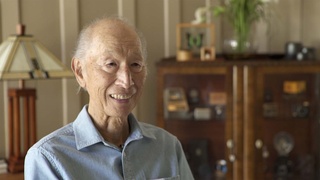Interviews
World War II hysteria against Japanese in New York City
When the war broke out, she (my sister) was working, as I recall, for Mitsubishi so, naturally, she lost her job immediately. Her husband lost his job. He had been working at a hospital because he, too, was an Issei—a young Issei. They both lost their jobs. They were stuck in their apartment in New York City for a long time, and through the goodness of other friends, they were able to, at least, get food and eat. I am sure you’ve been told by people who lived in New York at the time that the [city] mayor, Mayor Fiorello LaGuardia, had announced that “people of Japanese descent walk the streets of New York at their own risk.” He was not protecting them. He was giving no assurance for their safety, so it was scary for them. But eventually, as the hysteria died down and the war turned more in favor of the United States, they were pretty much left alone—the Japanese who lived in New York City.
Date: August 26, 1998
Location: Virginia, US
Interviewer: Darcie Iki, Mitchell Maki
Contributed by: Watase Media Arts Center, Japanese American National Museum



